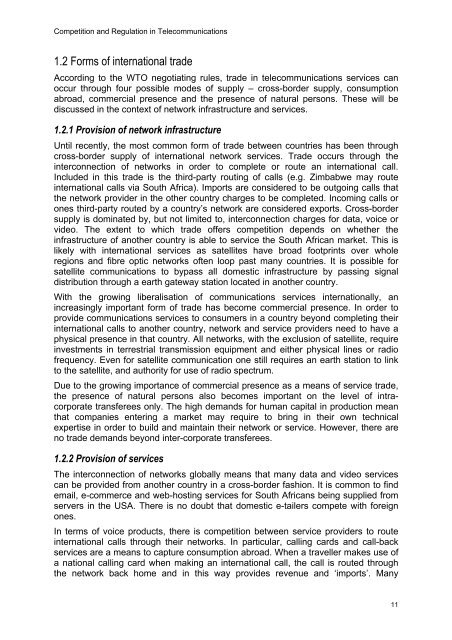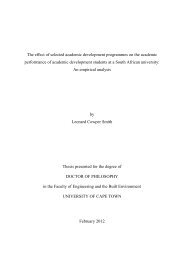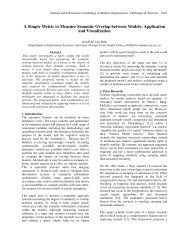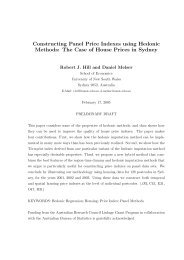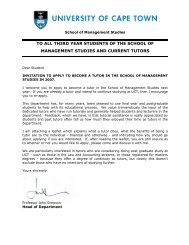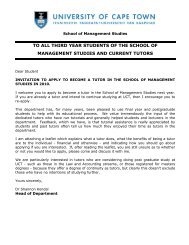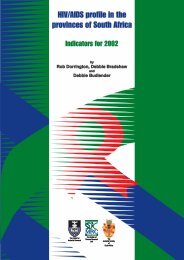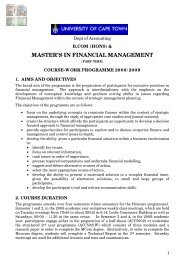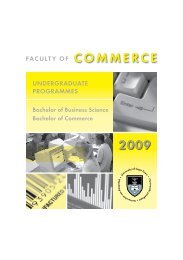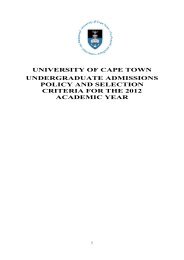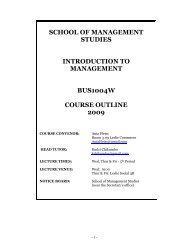Competition and Regulation in the Telecommunications Industry in ...
Competition and Regulation in the Telecommunications Industry in ...
Competition and Regulation in the Telecommunications Industry in ...
You also want an ePaper? Increase the reach of your titles
YUMPU automatically turns print PDFs into web optimized ePapers that Google loves.
<strong>Competition</strong> <strong>and</strong> <strong>Regulation</strong> <strong>in</strong> <strong>Telecommunications</strong>1.2 Forms of <strong>in</strong>ternational tradeAccord<strong>in</strong>g to <strong>the</strong> WTO negotiat<strong>in</strong>g rules, trade <strong>in</strong> telecommunications services canoccur through four possible modes of supply – cross-border supply, consumptionabroad, commercial presence <strong>and</strong> <strong>the</strong> presence of natural persons. These will bediscussed <strong>in</strong> <strong>the</strong> context of network <strong>in</strong>frastructure <strong>and</strong> services.1.2.1 Provision of network <strong>in</strong>frastructureUntil recently, <strong>the</strong> most common form of trade between countries has been throughcross-border supply of <strong>in</strong>ternational network services. Trade occurs through <strong>the</strong><strong>in</strong>terconnection of networks <strong>in</strong> order to complete or route an <strong>in</strong>ternational call.Included <strong>in</strong> this trade is <strong>the</strong> third-party rout<strong>in</strong>g of calls (e.g. Zimbabwe may route<strong>in</strong>ternational calls via South Africa). Imports are considered to be outgo<strong>in</strong>g calls that<strong>the</strong> network provider <strong>in</strong> <strong>the</strong> o<strong>the</strong>r country charges to be completed. Incom<strong>in</strong>g calls orones third-party routed by a country’s network are considered exports. Cross-bordersupply is dom<strong>in</strong>ated by, but not limited to, <strong>in</strong>terconnection charges for data, voice orvideo. The extent to which trade offers competition depends on whe<strong>the</strong>r <strong>the</strong><strong>in</strong>frastructure of ano<strong>the</strong>r country is able to service <strong>the</strong> South African market. This islikely with <strong>in</strong>ternational services as satellites have broad footpr<strong>in</strong>ts over wholeregions <strong>and</strong> fibre optic networks often loop past many countries. It is possible forsatellite communications to bypass all domestic <strong>in</strong>frastructure by pass<strong>in</strong>g signaldistribution through a earth gateway station located <strong>in</strong> ano<strong>the</strong>r country.With <strong>the</strong> grow<strong>in</strong>g liberalisation of communications services <strong>in</strong>ternationally, an<strong>in</strong>creas<strong>in</strong>gly important form of trade has become commercial presence. In order toprovide communications services to consumers <strong>in</strong> a country beyond complet<strong>in</strong>g <strong>the</strong>ir<strong>in</strong>ternational calls to ano<strong>the</strong>r country, network <strong>and</strong> service providers need to have aphysical presence <strong>in</strong> that country. All networks, with <strong>the</strong> exclusion of satellite, require<strong>in</strong>vestments <strong>in</strong> terrestrial transmission equipment <strong>and</strong> ei<strong>the</strong>r physical l<strong>in</strong>es or radiofrequency. Even for satellite communication one still requires an earth station to l<strong>in</strong>kto <strong>the</strong> satellite, <strong>and</strong> authority for use of radio spectrum.Due to <strong>the</strong> grow<strong>in</strong>g importance of commercial presence as a means of service trade,<strong>the</strong> presence of natural persons also becomes important on <strong>the</strong> level of <strong>in</strong>tracorporatetransferees only. The high dem<strong>and</strong>s for human capital <strong>in</strong> production meanthat companies enter<strong>in</strong>g a market may require to br<strong>in</strong>g <strong>in</strong> <strong>the</strong>ir own technicalexpertise <strong>in</strong> order to build <strong>and</strong> ma<strong>in</strong>ta<strong>in</strong> <strong>the</strong>ir network or service. However, <strong>the</strong>re areno trade dem<strong>and</strong>s beyond <strong>in</strong>ter-corporate transferees.1.2.2 Provision of servicesThe <strong>in</strong>terconnection of networks globally means that many data <strong>and</strong> video servicescan be provided from ano<strong>the</strong>r country <strong>in</strong> a cross-border fashion. It is common to f<strong>in</strong>demail, e-commerce <strong>and</strong> web-host<strong>in</strong>g services for South Africans be<strong>in</strong>g supplied fromservers <strong>in</strong> <strong>the</strong> USA. There is no doubt that domestic e-tailers compete with foreignones.In terms of voice products, <strong>the</strong>re is competition between service providers to route<strong>in</strong>ternational calls through <strong>the</strong>ir networks. In particular, call<strong>in</strong>g cards <strong>and</strong> call-backservices are a means to capture consumption abroad. When a traveller makes use ofa national call<strong>in</strong>g card when mak<strong>in</strong>g an <strong>in</strong>ternational call, <strong>the</strong> call is routed through<strong>the</strong> network back home <strong>and</strong> <strong>in</strong> this way provides revenue <strong>and</strong> ‘imports’. Many11


